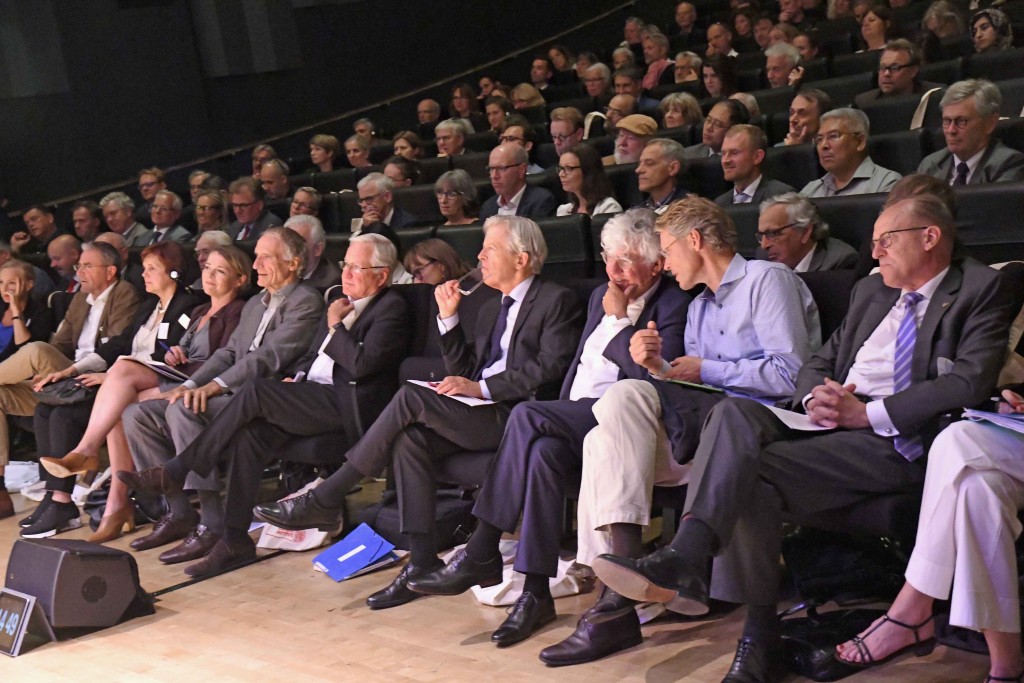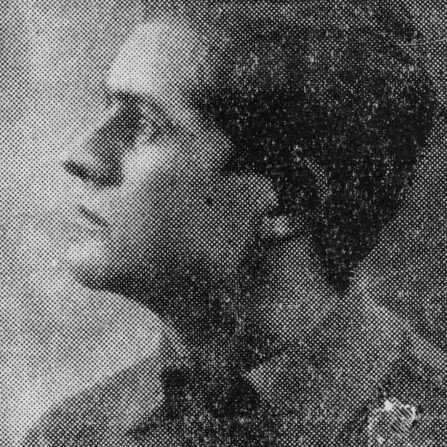See the full conference programme here:
Welcome and Introduction
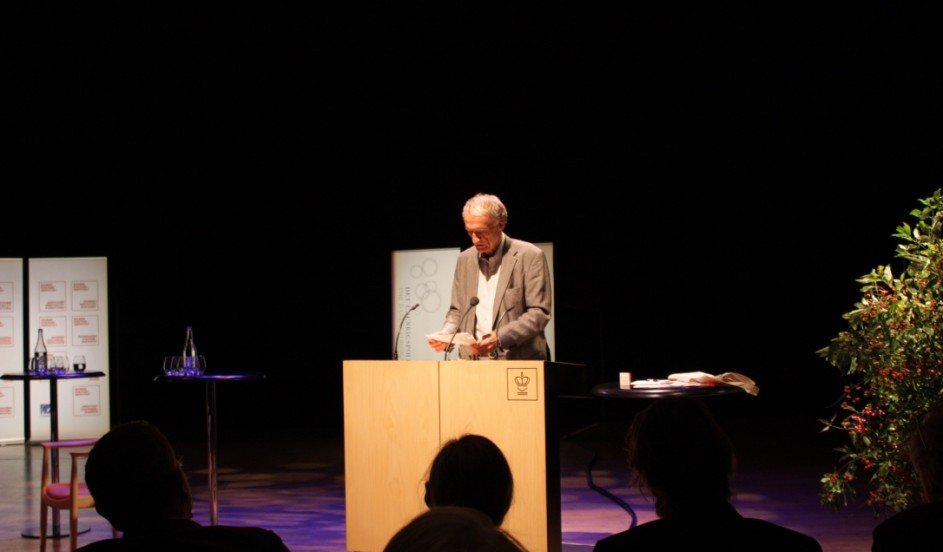
Welcome by Chairman Michael Christiansen
Introduction by Danish Minister for Culture, Bertel Haarder
Welcome by Chairman Michael Christiansen
The Chairman of Danish Cultural Institute, Michael Christiansen, welcomed the audience of around 400 Danish and International guests from the world of arts and culture, cultural and foreign policy, philanthropy, business, NGOs, diplomacy, research, media, etc.
Michael Christiansen noted that 75 years is a landmark for Danish Cultural Institute’s history and experiences – values and operating methods, that are just as relevant today as they were 75 years ago.
The Chairman recalled the Danish Physicist and Nobel Prize Winner, Niels Bohr, who was an important member of the founding fathers of the Institute in 1940. Bohr expressed the values and purpose of the Institute as the ability to combine an openness and willingness to learn from the outside world, which Denmark is an inseparable part of, and being able to hold on to the Danish roots and heritage.
Michael Christiansen remarked that the founding of the Institute was a question of both safeguarding and strengthening Danish culture in a troublesome time, and that this could only be done through cultural relations based on dialogue, exchange and mutual learning.
By inviting representatives from a cross section of relevant organisations to the conference, Danish Cultural Institute hopes to set in motion a new debate about how we can put culture in its rightful place, and not just be a tiny part of Danish foreign policy, but make it the very heart of it. Resources are limited and to make sure that they are used in a more intelligent manner, DCI proposes to unite the efforts of the Cultural Institute with all the other various Danish players in the field of international and intercultural dialogue. This can safeguard our ability to foster openness through dialogue with others. Foreign policy today seems to be mostly about security, trade and economics. Danish Cultural Institute wishes to join forces with other organizations and make Danish cultural values a stronger part of Danish foreign policy.
You can see the full welcome here
Introduction by Danish Minister for Culture, Bertel Haarder
The Minister for Culture Bertel Haarder congratulated Danish Cultural Institute on its 75 years of existence and addressed the foundational values on which the institute was built. The Minister stressed that the purpose of the institute has remained the same over the years, which is not to promote culture as a tool of national superiority or pride, but to exchange culture on the premise of culture itself. Culture, the Minister remarked, is a vehicle of friendship, alliance and an ever expanding knowledge of each other through the exchange of art and artists. It is about what we can learn from each other, and as such, the institute lives up to its founding credo to this day.
The Minister stated that culture is by no means irrelevant in foreign policy, because art and culture appeal to our emotions as human beings and facilitates an opening where politics and governments fail. Cultural exchange is a way to present differences, that are inclusive, and create community and friendship, something the Minister recalled experiencing in the wake of the Cold War, when the Danish Cultural Institute set up its Baltic branch in Riga, which circumvented traditional diplomacy to ensure dialogue.
The Minister was quite clear in expressing that culture can be an extension of politics through cultural diplomacy, but that the very nature of art and culture is free and provocative, which is why there is a need to separate politics and culture. The arms-length principle, which the institute operates under, ensures an uninhibited cultural dialogue between peoples.
You can see the full introduction here
Europe - Culturally and Politically
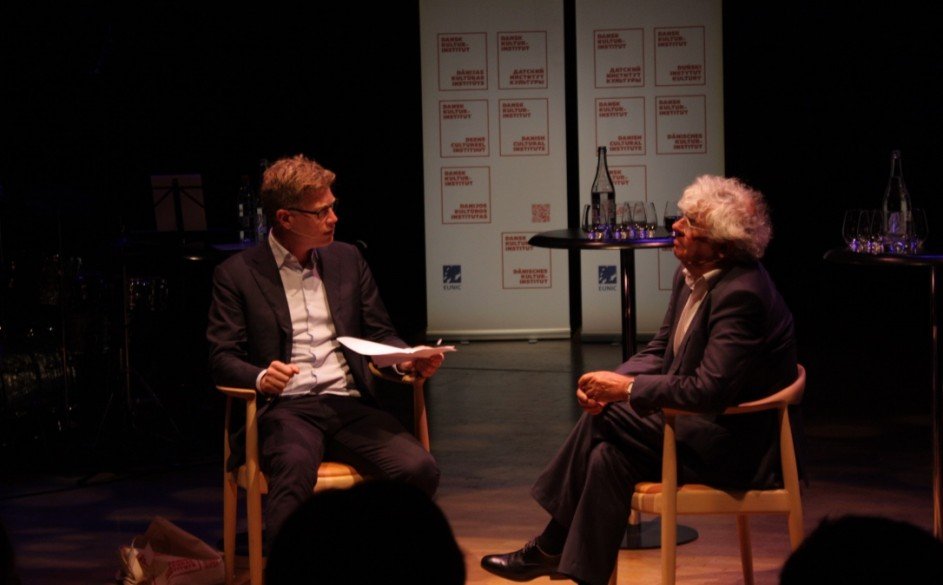
Conversation with Geert Mak, Dutch historian, journalist and author of the masterpiece 'Europe - Travels through the Twentieth Century'
Moderator Martin Krasnik welcomed the renowned author and historian Geert Mak to the stage to discuss the relationship between culture and politics in contemporary Europe. Krasnik opened the discussion by addressing the sense of cultural unity in Europe today, because Geert Mak had argued in a previous work that Europe was more interwoven culturally in the years before the First World War than it is now.
The Dutch historian remarked that with the advent of the culture of the masses and the opening of societies after the Great War, culture became a vehicle for nationalism, which changed not only the cultural world, but also entire societies. He went on to say that in the age of internet and global communication, there is a tendency in people to seek out familiar information and communities and separate oneself from news sources that do not fit one’s view of the world, which creates an artificial, enclosed perspective of reality.
Mak said, that the Danish cartoon crisis was an example of this development. Culturally specific phenomena are misinterpreted and misused due to the lack of context provided. The tools of the globalized world can then bring us together, but at the same time divide us up into fractions.
Krasnik posed the question, if Europeans have a tendency to project our own national vision and confuse it with what we think is Europe, to which Mak profoundly agreed. He said that the countries in the EU, for instance, mostly have the same attitude toward the design of their own state as they have toward that of Brussels.
The two went on to discuss the role of culture in European politics. Invoking Benedict Anderson, Mak commented that culture is the driving force of all imagined communities, and that the problem of Europe is the lack of a common imagined community, it is a fractured whole. However, Geert Mak admitted that this very dynamic is the source of Europe’s strength as an imagined continent. Despite the threat of war, the fragmented continent has ensured competition among nation-states and thus development, exploration and discovery has ensued. According to Mak the multiple crises, that Europe faces now, is best solved through cultural dialogue and understanding.
Addressing the issue of cultural compatibility, Martin Krasnik asked if different cultures are inherently incompatible, and are just co-existing as some politicians would have you believe, or if the popular definition of the time is wrong. Mak replied, that the assertion that cultures are incompatible is simply not true, and that history shows us that the greatest European artists and national treasures, whether they be Rembrandt, Shakespeare or Hans Christian Andersen, were influenced by the proverbial other. The problem for Mak lies with the rise of populist rhetoric in European politics, where fear is the driving emotion. The Dutch historian then urged the politicians of Europe to return to the honourable intentions that brought them into politics to begin with.
Krasnik and Mak discussed why it seemed to be the political fringes that dominate the cultural discussions in most of Europe, and Mak stated that the strategies of the center-right and center-left politicians to adhere to technocratic rhetoric devoid of visions is what is paving the way for the fringe-politicians in Europe. Mak then encouraged the moderate politicians of Europe not to talk about culture and use it for political means, but rather to listen to culture and embrace the input that the cultural field has to offer.
On the topic of culture’s role in foreign policy, Geert Mak stated that institutes like the Danish Cultural Institute play a crucial role in cultivating the sense of a shared, if imagined, community, and that the Ministry of Foreign Affairs should deem it a central task to ferment such a feeling in a divided Europe.
You can see the full conversation here
What Can Denmark Contribute with and Achieve Internationally Through Culture?
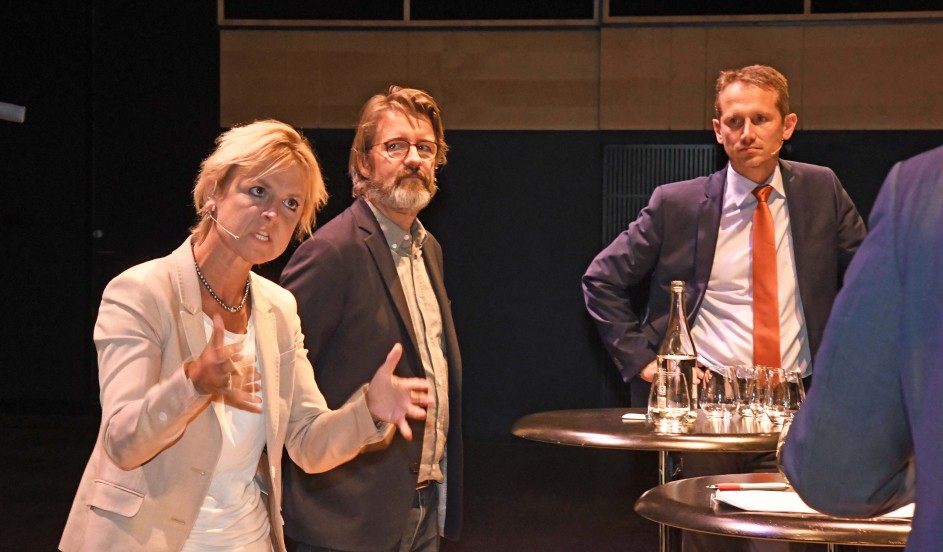
Introduction by Kristian Jensen, Danish Minister for Foreign Affairs.
Conversation with Foreign Minister Kristian Jensen, Prorector at Copenhagen University, former Minister and Chairman of the Danish Foreign Policy Society, Lykke Friis, and Artist Olafur Eliasson.
Comments to Panel on How Businesses and Foundations Can Work Internationally Through Culture: Flemming Besenbacher, Chairman of the Carlsberg Foundation and Supervisory Board at Carlsberg A/S, Torben Möger Pedersen, CEO of PensionDanmark, and Anne Birgitte Gammeljord, Chairman of the Augustinus Foundation.
Introduction by Danish Minister for Foreign Affairs, Kristian Jensen
The Minister for Foreign Affairs spoke about the role and concept of culture in Danish foreign policy, and the approach to culture with which the Danish representations, consulates and embassies work abroad. In the words of the Minister, the Foreign Service tries to embody Danish culture and values in their daily work, and culture is at the center of the Ministry’s work. According to the Minister, Danish representatives are cultural envoys when acting in an official capacity abroad, and thus agents of culture in all aspects of their profession.
The Minister then remarked on the core elements of Danish culture and how well received Danish culture and values are abroad. Anecdotally he mentioned his recent visit to the US, where he was pleasantly surprised to hear President Obama praising the traditions and collective learning practices of the folk high schools and their importance in forming the leaders of the American civil rights movement.
For the Minister an independent cultural scene and a strong civil society are the foundations of Danish democracy. In actively promoting Danish culture and art, the Foreign Ministry sends a message to the world about what kind of society we have and leads by example. The Minister also stressed the importance of keeping cultural and public diplomacy present in the foreign policy as a means of cooperation and partnership with otherwise politically incompatible nations.
You can see the full introduction here (in Danish)
Conversations with Foreign Minister Kristian Jensen, Prorector at Copenhagen University, former Minister and Chairman of the Danish Foreign Policy Society, Lykke Friis, and Artist Olafur Eliasson
Comments to Panel on How Business and Foundations Can Work Internationally Through Culture: Flemming Besenbacher, Chairman of the Carlsberg Foundation and Supervisory Board at Carlsberg A/S, Torben Möger Pedersen, CEO of PensionDanmark, and Anne Birgitte Gammeljord, Chairman of the Augustinus Foundation.
Martin Krasnik welcomed the Minister for Foreign Affairs Kristian Jensen, Prorector from the University of Copenhagen Lykke Friis and artist Olafur Eliassson to the stage to discuss what Denmark can achieve internationally through culture, as well as debate the general function of culture in society.
Krasnik prefaced the discussion with an analysis of the current state of affairs when it comes to funding for cultural exchange, noting that the downgrading of cultural attachés in the Foreign Service and the closing of state funded cultural institutions might indicate an excessive focus on economic policy and trade and an increasing devaluation of culture in Danish foreign policy.
According to the Foreign Minister, the cutbacks on cultural exchange programmes were made because of the government’s priority to substantially decrease Denmark’s bilateral foreign aid. He went on to reiterate that the representatives of the Danish Foreign Service act as cultural emissaries when acting in a professional capacity abroad.
Lykke Friis argued that the embassies have a hard time making room for culture, when they have to work for trade and export interests and the general foreign policy objectives. She identified the problem as a lack of resources and a matter of priorities, and stated that the same applies when it comes to foreign languages and other cultural training. She went on to stress the importance of non-governmental cultural actors, like the Danish Cultural Institute or universities, in driving the cultural foreign policy forward.
Olafur Eliasson talked about his experiences with European diplomats and representatives from the different foreign services and compared it to Denmark, where he saw deficits in the official approach to culture. He lamented the intellectual deficit of the so-called cultural envoys working for the Ministry, with whom he often felt his art were being used as a tool in another agenda.
Eliasson then insisted, that culture can serve a function in foreign policy without being compromised. The strength of art and culture is – when it is at its best – that it moves the spectator to see himself or herself in another context.
The discussion was followed by commentaries from Flemming Besenbacher, Chairman of the Carlsberg Foundation and of the Supervisory Boards of property companies affiliated with the Carlsberg Foundation, as well as from Torben Möger Pedersen, CEO of PensionDanmark, and from Anne Birgitte Gammeljord, Chairman of the Augustinus Foundation and member of CAF Invest A/S and Chr. Augustinus Factories A/S.
Flemming Besenbacher remarked that, the Carlsberg Foundation works to give something back to society by supporting art and culture as well as science, without expecting this effort to increase profits for the parent company. He told how they operate with three bottom lines for creating value: one for the shareholders, one for the employees and one for society.
Torben Möger Pedersen noted that PensionDanmark values its corporate social responsibility and invests in sustainable development projects in West Africa as a way to combine culture and profitability. He argued that the definition of culture should extend to promoting Danish values and solutions, not just artistic expressions.
Anne Birgitte Gammeljord talked about the Augustinus Foundation’s work to support artists and ensure artistic quality, which sometimes entails international projects and cooperation, but stressed that the foundation does not support the business community.
The ensuing conversation between the three speakers dealt with the nature of art and culture, and whether they reflect national or political values, as the Foreign Minister suggested, or if they facilitate understanding between people through the individual’s experience with said artistic or cultural expression, as Olafur Eliasson advocated.
You can see the full conversation and comments here (in Danish)
How to Foster Positive International Cultural Relations? Experiences and Best Practices
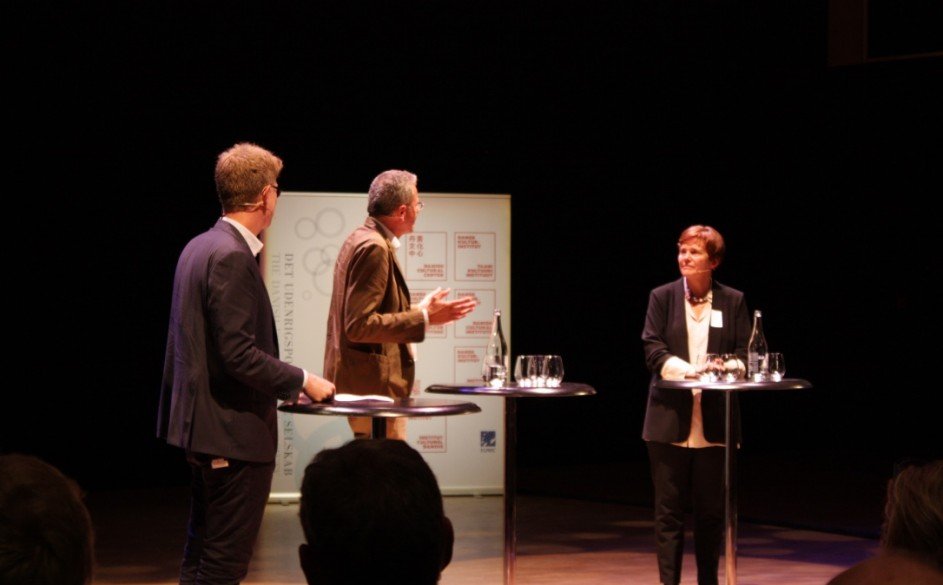
Introduction by Irina Prokhorova (Russia), internationally recognized literary critic and cultural historian, Head of the independent publishing house New Literary Observer, co-founder of the Mikhail Prokhorov Foundation.
Conversation between Irina Prokhorova and Writer Jens Christian Grøndahl.
Comments from Theatre Director Henrik Hartmann, Architect and Founder of 3XN, Kim Herforth Nielsen, and Isabelle Schwarz (France/Germany), Head of Advocacy, Research and Development of the European Cultural Foundation.
Introduction by Irina Prokhorova
Irina Prokhorova, internationally recognized literary critic and cultural historian, Head of the independent publishing house New Literary Observer, co-founder of the Mikhail Prokhorov Foundation, explained how the foundation tries to challenge and break down Russian stereotypes through cultural exchange. She presented her work with the alternative contemporary festival ‘Unknown Siberia’, displayed in Lyon in 2010, as an example of representing a non-stereotypical image of her country. In this way, they tried to break free of the totalitarian, pre-revolutionary exotic and pseudo-oriental realities, usually associated with Russia.
She continued with some general reflections on culture’s position in society. Because even though everyone is always stressing the importance of culture, it is placed at the very bottom of the news hierarchy, and culture is always the first area of society to be exposed to cutbacks, which means that we do not consider culture a necessity.
Prokhorova explained how culture in Europe for the past 300 years has created the pool of ideas, which has nourished all other activities of society. From this pool, we still create our national identities. However, something is wrong with the pool of ideas and therefore we need to reevaluate them. In her opinion, she explained, it is not that the values are wrong, but it is a problem that the values do not speak to the new generation, whom have never experienced the horrors of the wars.
In continuation hereof, she explained how the objective problem is that we try to create a transnational communicational world, but we still live in a world of romantic sensibility within national states. We are concerned with representing our own state’s uniqueness, instead of focusing on the common pool of ideas and the need to reevaluate these ideas.
Therefore, Prokhorova concluded that, because we have a tendency to exchange stereotypes and focus on our own specifics, it becomes difficult to create a new European identity, which is necessary at this point in history. She then underlined that we all are in the same boat, and that there has to be made an intellectual attempt to reveal the ideas of democracy that can attract other generations and cultures.
You can see the full introduction here
Conversation between Irina Prokhorova and writer Jens Christian Grøndahl.
Comments from Theatre Director Henrik Hartmann, Architect and Founder of 3XN, Kim Herforth Nielsen, and Isabelle Schwartz (France/Germany) Head of Advocacy, Research and Development of the European Cultural Foundation.
The question of how to foster positive international cultural relations entered a new phase, when the Danish Writer Jens Christian Grøndahl in conversation with Irina Prokhorova reflected on her speech and emphasized the points he found particularly important. It became a question of how and why culture can heal the different controversies in history, and how culture can help us overcome the differences between nationalities and between generations.
The need for new ideas or new versions of new ideas were underlined yet again and so were the need to reinvestigate identity. Following previous speaker Olafur Eliasson, Grøndahl stressed how good art transcends national borders, as it carries the ability to reveal the viewer’s self regardless of nationality.
In Grøndahl’s view it is not important to show the world who ‘we are’ as a nation through culture. Instead culture should be able to show us, what we didn’t realize we were. He tied this reflection to the old European division between French Enlightenment and German Romanticism and how the controversy between these different philosophical attitudes perhaps finally could be healed by focusing on culture’s capability to make us aware of the fact, that we are all human before anything else.
In response, Prokhorova extended the concept of culture by reminding us, how culture today includes a wide spectrum of activities and that the internet generation and their activities online should be considered as contemporary mass culture. It is a pool of ideas and cultural outputs that are constantly exchanged. In relation hereto, and with reference to the rise of totalitarian political ideas all over Europe, she made the point, that artists and intellectuals have a responsibility to engage with this contemporary mass culture created by the internet generation. Because if they ignore the pool of ideas that stems here from, the wrong ideas will flourish.
The talk was followed by presentations from Theatre Director Henrik Hartmann, Architect, Founder of 3XN Kim Herforth Nielsen and Isabelle Schwarz, Head of Advocacy at European Cultural Foundation.
Hartmann shared his experiences with organizing children’s theater in a refugee camp in Amman. He said that the audience mirrors themselves in the stage plays, and experience that when the actors aren’t afraid to stand up and talk about their rights, then they don’t have to be either.
Herforth reflected on the role architects can play in the cultural exchange context. He remarked that he felt the invitations for architects to come out and work abroad is counter-acting the mentality of ‘you and I, them and us’, and is helping to build connections between countries.
Schwarz presented a global cultural leader program for youths and highlighted the programmes’ potential. What she found interesting about it was, that you tap into the potential of the next generation, so you are actually looking into the needs of a young generation of cultural entrepreneurs, artists, creatives and so on.
Prokhorova was given the last remark, where she stressed the need for intellectual guidance and action in terms of formulating new ideas and overcoming the many divides previously discussed.
You can see the full conversation and comments here
Political debate on the Third Pillar of Foreign Policy
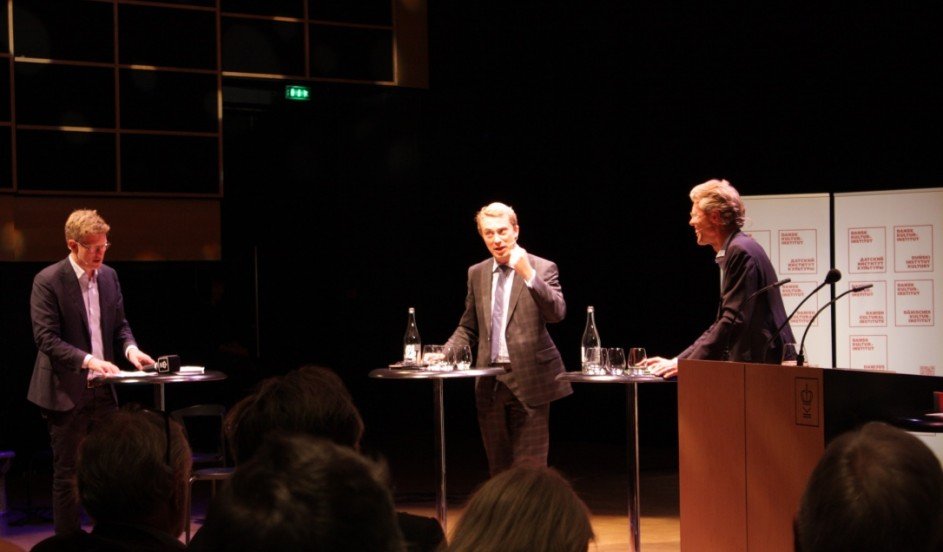
Debate between Writer and Historian, Bo Lidegaard, and MEP for the Danish People's Party, Morten Messerschmidt.
Moderated by Martin Krasnik, author and historian Bo Lidegaard discussed culture in foreign policy and Danish cultural policy with MEP from the Danish People’s Party, Morten Messerschmidt.
Martin Krasnik initiated the discussion by posing the question whether diplomacy and culture are complimentary and can have meaningful overlaps in foreign policy.
Bo Lidegaard asserted that diplomacy and culture are fundamentally different. Whereas diplomacy is determined to achieve something tangible, something concrete, and is goal-oriented, culture is oftentimes an expression or an experience designed to invoke something in the spectator.
Morten Messerschmidt disagreed. He stated that to him art and culture are profoundly emotional, and that they are vehicles with which even political adversaries can find common ground. To him, art and culture can suspend the limits and differences between people and address a common emotional, human core. He argued that it can be applied diplomatically to supersede political differences and find ways of cooperating. Whereas politics is mainly a rational endeavor, culture touches something deeper within.
Krasnik then invoked Geert Mak’s words, stating that culture and politics are both emotional, to which Messerschmidt agreed but argued that culture does not possess the ulterior motives that politics does. There is no assumption of intention or motivation in culture per se.
The discussion proceeded to focus on cultural funding. Krasnik commented that the Danish People’s Party’s focus in cultural politics seemed to be on Danish funding for Danish artists, which Messerschmidt confirmed. This led to debate between the Lidegaard and Messerschmidt on the very nature of intercultural exchange and the origins of cultures and nationalities.
Messerschmidt argued that the intercultural and international could not exist without first having the national, which Lidegaard disagreed with. Lidegaard noted that Danish and European culture is inextricably linked, and that one does not have primacy over the other, because culture is the fluid movement of ideas and expressions, and that reducing culture to national enclaves made no sense.
Krasnik then stressed that the core of their differences seemed to be their funding priorities. Whay should be the focus? Where should we allocate ressources?
Lidegaard questioned whether there is such a thing as an independent Danish cultural scene or an essential Danish culture, which is then built upon in meeting the international or European community, or if culture is reciprocal in nature and is formed by outside influences and forms them in turn. Messerscmidt agreed that Denmark and Europe are linked, and replied that because Danish and European culture are linked, allocating funding for Danish art and culture should not be seen as in opposition to the international or intercultural exchange.
You can see the full debate here
Final Remarks
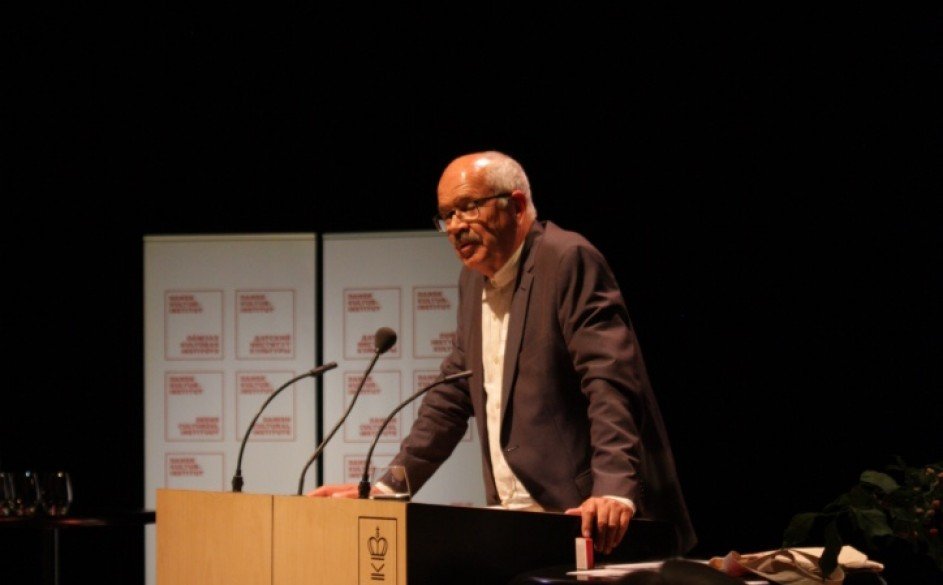
Final Remarks by Secretary General of Danish Cultural Institute, Michael Metz Mørch
The Secretary General expressed his gratitude for the attendance and the interest of the audience. He stated the focus of Danish Cultural Institute, which is to create a platform for Danish art and culture. This is a way to increase the visibility of Danish art and culture and of introducing the rest of the world to Denmark, which hopefully strengthens and emboldens Danish art and culture.
Michael Metz Mørch noted that there had been a profound interest in the theme of the conference. He stressed the importance of culture in foreign policy, regardless of whether it is called cultural diplomacy or cultural exchange. He then urged the relevant cultural actors, who have international ambitions, to seek out the Danish Cultural Institute for cooperation on these matters. The conference, he believed, would lead to improved dialogue on how to allocate and use resources in a strengthened collaboration between the different organizations.
The Secretary General finished by thanking the staff at the Danish Cultural Institute for their hard work and effort in putting together the anniversary conference and commended them for the success of the event.
You can see the full speech here
Fotos: Hasse Ferrold Foto, og Rosalia Fenger/DKI.
